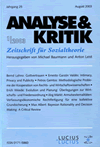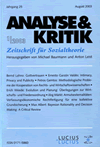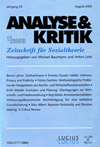Suchergebnisse
"Frank Dietrich"
Titel: Moral Expertise and Democratic Legitimacy
Autor: Frank Dietrich
Seite: 275-284
Abstract: In modern democracies, moral experts play an increasingly important role in law-making. Apart from the question of which competences characterize moral experts, their influence on the legitimacy of democratic procedures must be discussed. On the one hand, the contribution of moral experts promises to improve the quality of decision-making. On the other hand, however, moral experts cannot claim to represent the will of the people. In this essay, at first a concept of the moral expert will be sketched which does without the assumption of a privileged access to ’moral truths’. Then a procedural understanding of democratic legitimacy without epistemic components will be defended. Finally there will be a distinction between the purely consultative and the quasi-legislative tasks of ethics committees. Whereas councelling by moral experts does not influence the legitimacy of democratic procedures, giving them quasi-legislative functions is connected to risks in this respect.
Titel: Liberalismus, Nationalismus und das Recht auf Selbstbestimmung
Autor: Frank Dietrich
Seite: 239-258
Abstract: In recent years theorists, such as Yael Tamir and David Miller, have proposed a liberal form of nationalism thereby combining two seemingly incompatible traditions of thought. Perhaps the most controversial element of their theories is the claim that national communities should be accorded with a right to political self-determination. In the article it is explained, firstly, why membership in a nation is seen as important for the individual's well-being and, secondly, why statehood is deemed necessary for the thriving of the nation. Subsequently, two problems of the liberal nationalists' argument for political self-determination are discussed. It is argued, firstly, that national communities only need some form of regional autonomy to achieve their most important goals and, secondly, that non-national communities, e.g. religious groups, can base their demand for political sovereignity on the very same argument.
Titel: Die moralische Bedeutung politischer Grenzen
Autor: Frank Dietrich
Seite: 248-258
Abstract: In his recent book One World one of Peter Singer's main concerns is the preferential treatment of compatriots. Two aspects of Singer's theoretical reflections on this issue are critically discussed: the use of an impartiality test as basis for the justification of special duties and the resulting condemnation of partial preferences for compatriots. Subsequently, an alternative way to justify special duties is outlined and applied to the case of fellow citizens. It is argued, that partiality to compatriots can be defended, if special duties are regarded as a constitutive part of valuable relationships.
Titel: Die 'sozialdemokratische' und die 'liberale' Variante der neoaristotelischen Sozialphilosophie
Autor: Frank Dietrich
Seite: 192-212
Abstract: This article examines the neoaristotelian theories of Martha Nussbaum and Douglas Rasmussen/Douglas Den Uyl. Both sides give a similar account of good human living, which emphasizes the significance of individual autonomy. But they disagree sharply on the political institutions necessary to promote human flourishing; Nussbaum formulates a 'social democratic, position; Rasmussen/Den Uyl hold a 'liberal' standpoint. The article explores both lines of reasoning. It is shown that neither Nussbaum nor Rasmussen/Den Uyl present conclusive arguments for their political position.

Social Epistemology
2012 (34) Heft 2
Editorial
The research program of social epistemology developed from a critique of philosophical epistemology around thirty years ago. Since then it has attracted ever-growing attention among philosophers. But social epistemology also offers prolific alignments for the social sciences. The starting point of social epistemology is the elementary fact that most of our knowledge is acquired not by our own autonomous exploration but by relying on information from others: on testimony. This is especially true ...

The Actuality of Communitarianism
2005 (27) Heft 2
Editorial
'Communitarianism' drew extraordinary public attention in the early nineties and still exerts some influence on the social sciences and political philosophy, even if it is no longer as controversially debated as in former days. What still fires interest in the claims and ideas of communitarianism today, albeit on a lower level of public attention, is the widely felt fascination, in part perhaps also trepidation, vis-a-vis non-individualist social phenomena and trans-individualist social values a...

Legitimationsprobleme der Globalisierung
2003 (25) Heft 2
Editorial
Im Jahr 2000 entsprach der Anteil aller grenzüberschreitend gehandelten Waren und Dienstleistungen mehr als einem Viertel des weltweiten Angebots, während es noch 1970 nur etwa 10% waren. Zugleich 'globalisierte' sich in rapider Geschwindigkeit der Aktionsradius vieler Unternehmen. Allein im Jahr 2000 investierten diese Unternehmen 1,3 Billionen Dollar über Grenzen hinweg. Gemessen an ihren Umsätzen ist inzwischen eine Gruppe von etwa 15 Unternehmen kapitalstärker als die 60 ärmsten Staate...